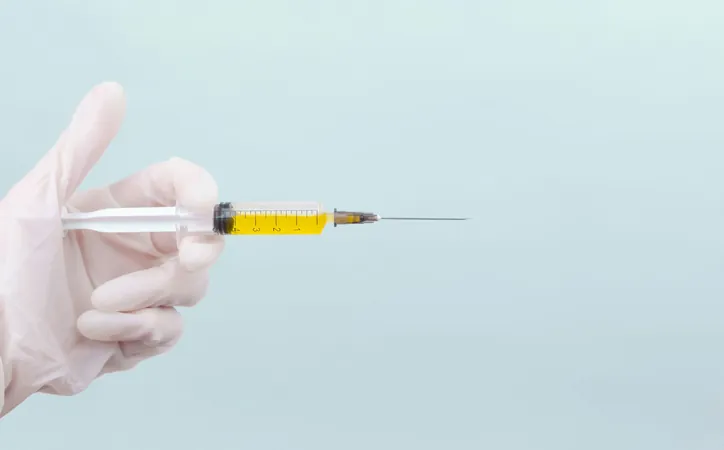
Measles Outbreak Crisis Intensifies as Federal Support Dwindles
2025-04-08
Author: Jia
Introduction
As the United States grapples with an alarming resurgence of measles, cities and states are feeling the strain of federal funding cuts from the Trump administration, undermining crucial public health responses intended to curb the outbreak. This week, reported cases have surged near 650 across 22 states, posing a significant threat of reaching a 34-year high.
Recent Tragedies
The tragedy deepened last week with the death of a second unvaccinated child in West Texas from measles. U.S. Health and Human Services Secretary Robert F. Kennedy Jr. attended the child's funeral, advocating for vaccinations as the best defense against the virus. However, his controversial stance on vaccines has raised eyebrows because he has, at times, expressed skepticism about their safety and recommended unproven alternatives such as cod liver oil and vitamin A to prevent measles—neither of which are scientifically supported for this purpose. Following these developments, a prominent vaccine expert under Kennedy resigned, citing his disapproval of the official's rhetoric.
Impact of Federal Funding Cuts
Federal cuts have thrown a wrench into state vaccination efforts, not only for measles but also for influenza and COVID-19. The abrupt termination of $11 billion in federal health grants was temporarily halted by a judge in Rhode Island following a legal challenge by several Democratic-led states. This decision comes too late for states like Minnesota, Texas, and Washington, where essential vaccination programs have already seen cancellations.
Texas Under Strain
In Texas, for instance, the cancellation of numerous free vaccination clinics has thrown the state's health initiatives into disarray. As of early April, Texas reported 499 cases of measles, raising alarms about an escalating public health crisis fueled by vaccine misinformation. Some unvaccinated children were even treated for vitamin A toxicity, a direct result of misguided advice stemming from Kennedy's statements.
Expert Insights
Experts have reiterated the urgency of immediately providing vaccination clinics, rapid testing for measles, and effective contact tracing. Dr. Susan Kansagra, chief medical officer for the Association of State and Territorial Health Officials, emphasized that measles is highly contagious, capable of infecting up to 90% of unvaccinated individuals in close proximity to an infected person.
CDC's Standpoint
The Centers for Disease Control and Prevention (CDC) has labeled vaccinations as the most effective barrier to measles. Yet, vaccine skepticism continues to build in Texas, exacerbating the outbreak’s severity. Dr. Ashish Jha, dean of Brown University's School of Public Health, has noted that the recent messaging surrounding alternative treatments has been not only misguided but potentially dangerous.
Responses from States
While states scramble to mitigate the fallout from diminished federal support, localized responses have varied. New Mexico has launched 22 free walk-in vaccination clinics and ramped up efforts to communicate health information, despite having to cancel contracts aimed at vaccination outreach in underserved communities. On the other hand, Kansas is advising that children in impacted areas receive vaccinations at 6 months of age rather than the usual 1-year threshold to combat the spread.
Possible Consequences of the Outbreak
Dr. Scott Gottlieb, former FDA Commissioner, has expressed concern that the current outbreak could jeopardize the United States' previously 'eliminated' status for measles, a classification achieved through years of successful vaccination efforts since 2000.
Public Awareness and Action
As the situation escalates, residents in both New Jersey and Colorado are being alerted to potential exposure risks, and public health officials are urging communities to prioritize vaccinations. A recent editorial from a prominent medical journal underscored the need for heightened awareness about vaccine safety and reliability, serving as a critical reminder of the importance of protecting public health against viral misinformation.
Conclusion
This mounting crisis prompts an essential call to action. With the nation on the brink of losing years of progress in measles elimination, there has never been a more crucial time for public cooperation and adherence to well-established health guidelines to protect our communities and, ultimately, save lives.
Stay tuned as we monitor developments in this ongoing saga and explore further strategies being employed by health officials nationwide.


 Brasil (PT)
Brasil (PT)
 Canada (EN)
Canada (EN)
 Chile (ES)
Chile (ES)
 Česko (CS)
Česko (CS)
 대한민국 (KO)
대한민국 (KO)
 España (ES)
España (ES)
 France (FR)
France (FR)
 Hong Kong (EN)
Hong Kong (EN)
 Italia (IT)
Italia (IT)
 日本 (JA)
日本 (JA)
 Magyarország (HU)
Magyarország (HU)
 Norge (NO)
Norge (NO)
 Polska (PL)
Polska (PL)
 Schweiz (DE)
Schweiz (DE)
 Singapore (EN)
Singapore (EN)
 Sverige (SV)
Sverige (SV)
 Suomi (FI)
Suomi (FI)
 Türkiye (TR)
Türkiye (TR)
 الإمارات العربية المتحدة (AR)
الإمارات العربية المتحدة (AR)